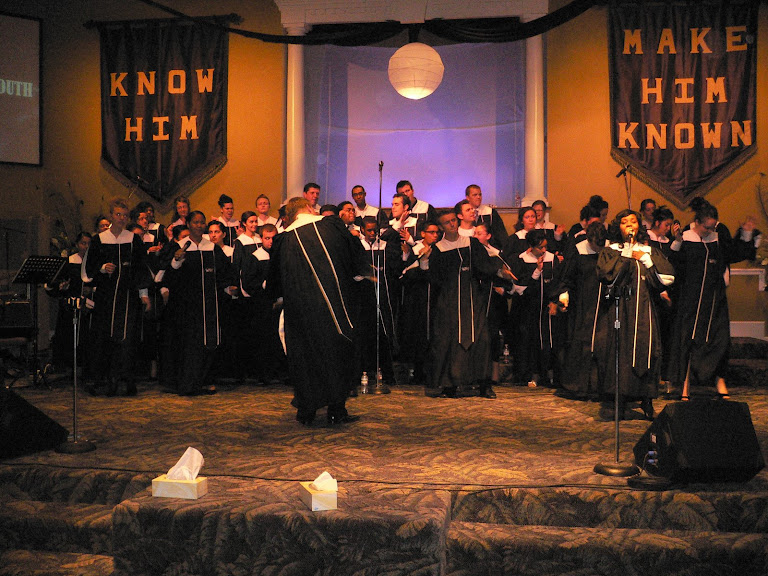 Sogogospelnews.com features articles by Bill Baize and I thought I would share some with you. Here's a current lesson on singing high tones - - -
Sogogospelnews.com features articles by Bill Baize and I thought I would share some with you. Here's a current lesson on singing high tones - - - 1. You must have confidence that you will be able to hit the note that you are reaching for. Much of the battle to sing good high notes is lost in this area. I remember before I ever studied how to sing, I was singing with The Smitty Gatlin Trio in Ft. Worth Texas. I had a high C to hit on one of the songs and I had been hitting it very well in practice. Time came for us to sing the song on the stage at the Will Roger’s Auditorium one night. There were several big name groups there and I really wanted to do well. At the time I was just starting to sing professionally. Opened up and went for the high C, it splattered all over the place (my voice cracked). I lost all my confidence that evening. It took me quite a while before I wanted to try a high C again. I finally gained my confidence back after I studied voice for a couple of years. Once I learned about posture, breathing, tone placement, and word pronunciation ,in my vocal studies, I was able to sing over and over consistent high C’s, and while singing with the Stamps Quartet I got to where I could sing an E flat above high C, which I did every night for sometime, when we were singing either “Rainbow of Love” or “When It’s My Time”. What was the difference? The difference was that I had studied and worked at making myself better by singing correctly. My voice still would crack at times if I didn’t sing correctly now. That’s why learning how to sing correctly, not only protects your voice for your old age, but it can give you the tools to know how to correct anything that doesn’t seem to work right. I know now that when I sing correctly I don’t crack. If I ever cracked, I would know what to do to correct it. What would I do? I think about my posture first, am I standing straight and are my vocal cords relaxed? Then I think about am I supporting the tone enough with the proper amount of air? Then I think about where I am placing the tone in my resonation chambers. When I do all of that correctly, my tone always comes out well with no quivers or cracks. Because I know how to do these things, I have confidence that when I do them correctly, that my notes will come out clear and not crack.
2. In singing higher tones, it is best to concentrate on vowel sounds more than the consonant sounds. Opera singers do this and that is why they can all sing well when they are young and during their later years in life. Vowel sounds are the foundations of the words that you will be singing. Therefore, if you learn how to sing them and their modifications, it will help you sing high notes better. Vowel sounds should take precedence over consonant sounds, in your pronunciation of words, while you are singing. There are certain consonants that seem especially hard to pronounce and still keep your singing mechanism in a relaxed state. One of those consonants is the letter R. Many great singers modify the R sound until it only really comes in on the very last of the pronunciation. For instance in the word “Art” in the song “How Great Thou Art” many of the great singers sing it like AAArT . Many ordinary singers sing it like ARRT. When you put to much emphasis on the R sound it throws your singing mechanism out of whack, and can cause problems, causing your voice to rasp out or crack when you least expect it. This is just one example of this phenomenon. This area of singing is part of what I call the fine tuning area. It helps you to fine tune your singing to a point that you are able to do good things with your voice that you previously couldn’t do. It is a real challenge and often it is better accomplished by having a good voice instructor listen to you and guide you in the direction that it takes to fix whatever problem you might have.
3. In singing higher tones, the most effective thing you can do is to remember to breathe correctly. Sometimes you have to really think, while you are singing, about your breathing. In singing higher tones, it is imperative to keep excellent breath support under your tones.
4. Remember to open your mouth widely, and remember the lessons of posture that I have written about previously, like holding your head straight. Do not turn your head to either side, tilt it back or forward too much. Keep your head on straight. Relax your lips, jaw and tongue and most of all your neck where your vocal cords are. For easier singing of high notes, push from your diaphragm and place your tone forward in your mask . You can even, most of the time, sing the higher tones to where they sound to you as extremely nasal tones. Most of the time, when we think that they are nasal to us, they are only then beginning to have the amount of mask tone that makes the tone, being sung, sound clear and understandable to the listener.
5. The best way to work on most of these things is with a vocal coach in person. You may try them yourself and put your singing on a tape or CD to listen back to. Then when you listen back, and let someone listen with you, you can critique yourself about whether you sound better or not.
My best advice is to go to a vocal coach and have him or her listen to you and help you with these things.
There is so much more that needs to be said about singing high tones. I can not possibly cover it all here in a column or two. It is time for me to close this month’s column.
Remember Psalm 118:6 says “The Lord is on My Side, I will not fear, what can man do unto me?” The Lord is on your side. Keep working for him and ministering to those that he gives to you to minister to. Don’t be discouraged, just keep on keeping on. God loves you and wants you to be all that he created you to be. Keep on the sunny side.
In His Service,
Bill Baize





No comments:
Post a Comment